In response to the Central Bank of Nigeria’s (CBN) proposal for a 70% tax on the excessive profits banks made from naira devaluation in 2023—profits which increased by at least 51% due to President Bola Tinubu’s economic reforms—there has been a noticeable rise in banks’ philanthropic activities.
The proposed excess profits tax, or windfall tax on foreign exchange gains, floated four months ago, appears to be part of the government’s strategy to address its declining revenue base. This is critical as the cost of governance continues to outpace income. For instance, Nigeria’s 2025 budget, totaling ₦49.7 trillion, relies on borrowing ₦13.08 trillion, while ₦15.33 trillion will be used to service the country’s enormous debt, which stands at an estimated ₦134.3 trillion. Only ₦34.82 trillion of the budget is expected to come from royalties and taxes.
To reduce the country’s dependence on borrowing, President Tinubu brought in Taiwo Oyedele, a former PwC West Africa tax head, to overhaul Nigeria’s outdated tax administration system, which the president has described as a relic of colonial times. Oyedele’s assignment, aimed at strengthening the system and generating more revenue, aligns with the government’s goal of improving infrastructure and services through increased fiscal resources has been welcome by most Nigerians who are looking forward to a better country with more robust infratructure which only more revenue can faciliate.
But there is a snag which is that some Nigerians are worried about the implications for the income accruing to their states from the federation account which they suspect will be reduced.
The excess profits tax proposal seems to have been seen by the president’s tax reform committee, which includes private-sector experts, as a readily available source of additional revenue. Many of these experts, familiar with banks’ financial records through previous auditing roles, likely identified the windfall profits as an easy target.
While banks initially resisted the proposal, they were cautious not to do so too publicly. Prominent figures like Olisa Agbakoba, a former Nigerian Bar Association president, and Mustafa Chike-Obi, chairman of the Bank Directors Association of Nigeria (BIDAN), voiced criticism. However, the Chartered Institute of Taxation of Nigeria (CITN), led by its president Chief Segun Agbeluyi, supported the move.
Subsequently, United Bank for Africa (UBA) chairman Tony Elumelu and First City Monument Bank (FCMB) CEO Ladi Balogun engaged with the presidency in consultations. Their temperate and conciliatory approach during interviews, following the initial announcement of the tax, helped ease tensions between banks and their regulator, the CBN, shifting the debate away from public confrontation.
The issue of the proposed excess profits tax was eventually moved from public discussion to private negotiations in boardrooms. This stands in sharp contrast to the uproar triggered by the four tax reform bills introduced by the Taiwo Oyedele-led committee, which are currently being debated in the National Assembly (NASS). These bills propose significant reforms to Nigeria’s colonial-era tax system, as highlighted by President Tinubu in his first media address since assuming office on May 29, 2023.
Before the lawmakers went on their annual recess, the bills had sparked intense controversy, particularly among northern lawmakers who felt the proposed changes, especially to Value Added Tax (VAT), would disproportionately benefit the south. This contentious debate deepened the longstanding ethnic, religious, and regional divides between northern and southern legislators, overshadowing traditional party lines and amplifying non-partisan tensions.
As the situation edged toward a potential crisis, a truce was brokered at the Aso Rock Villa. Legislators were urged to set aside their disagreements and take more time to review the bills thoroughly, enabling them to suggest reasonable amendments. President Tinubu, in numerous public statements, expressed his willingness to incorporate these adjustments before the bills’ final passage.
The vigorous debate surrounding these tax reform bills raises questions about how much more contentious the removal of petrol subsidies might have been had it been subjected to a similar public debate. If the tax reforms have ignited such a high level of scrutiny, one can only imagine the political turmoil that might have ensued over discussions on petrol subsidies or the unification of the dual naira-foreign exchange window.
This is where a very thin line separates leaders from being democrats or monarchies. That is because if as democrats they allow extensive and unending debates on critical development issues, action will never be taken. But if they ram policies down the throats of legislators , such leaders would be adorned with the toga of dictatorship or as one who is monarchical.
Therein lies the dilema and a justification for the aphorism “ uneasy lies the head that wears the crown”
And it is at times like that, that Executive Orders which are easier ways of making laws while bypassing the legislators are viable options. But they are restrictive and tenous as they lack wide coverage and the longevity that are inherent in laws passed via a due legislative process.
However, President Tinubu appears to recognize the critical importance of timing in politics. With a limited four-year term, he seems determined to implement key reforms early to gain public confidence and lay the groundwork for potential re-election.
Returning to the matter of banks and the excess profits tax, it seems likely that a compromise was reached between the CBN and the banking sector, possibly facilitated by the Bankers’ Committee—a coalition of bank managing directors. This may explain why the excess profits tax has not yet been enforced, appearing instead to have been put on hold.
One of the driving forces behind the foreign exchange gains tax is the urgent need to generate revenue to sustain governance amidst soaring costs. This includes ₦15.81 trillion allocated to debt servicing, with the country’s debt estimated to have reached ₦77 trillion by the time the Tinubu administration assumed office. Expanding the tax base has thus become a necessity.
In this context, banks, under pressure to meet new capital base requirements of ₦500 billion for international operations and ₦200 billion for regional operations, may have directed the government’s tax authorities to explore the potential of taxing electronic transactions. This includes levying charges whenever Nigerians transfer or receive funds electronically in their bank accounts.
The recently introduced Electronic Money Transfer Levy (EMTL) requires banks to deduct ₦50 on electronic transfers or receipts of ₦10,000 or more. With 231.1 million bank accounts in Nigeria as of July last year, the Nigeria Inter-Bank Settlement System (NIBSS) estimates that this levy could generate as much as ₦484 billion over three years. While this has the potential to be a significant revenue source for the government, it raises the question: will it come at the expense of already overburdened Nigerians?
Because the charges are relatively small—a minor percentage of the transaction amount—most bank account holders seem not to feel the pinch yet. This contrasts sharply with the public uproar that followed the removal of the petrol subsidy on May 29, 2023, which sent shockwaves through the economy. While the dust from the subsidy removal is gradually settling, the EMTL could create another source of tension between the government, banks, and the public. The question remains: is such friction unavoidable?
It appears banks are aware of the backlash before the tax that is currently in abeyance was imposed and the potential backlash of the EMTL when the banking public become conscious of it. In what seems to be an attempt to improve their public image and foster goodwill among customers, they have embarked on large-scale Cause Related Marketing (CRM) campaigns in past four (4) months or so. These efforts aim to balance corporate interests with public good, blending their business strategies with socially beneficial initiatives.
This is not the first time banks have faced criticism. When the Central Bank of Nigeria (CBN) proposed the excess profits tax on foreign exchange gains, I authored an article titled “Banks FX Gains Tax: How CSR Could Have Averted It”, published on August 13 last year. In the piece, I reflected on how proactive Corporate Social Responsibility (CSR) measures might have softened the blow of public disapproval. For instance, banks had previously undertaken commendable initiatives, such as renovating the National Arts Theatre and contributing to the CACOVID initiative, which provided medical and economic relief during the pandemic.
During the public launch of my book, “Leading From The Streets: Media Interventions By A Public Intellectual 1999–2019”, three months ago, I highlighted the stark contrast between the significant profits banks were declaring and the struggles of other sectors and ordinary Nigerians. I suggested that banks could demonstrate their commitment to the greater good by waiving certain fees, such as charges for SMS alerts and printed statements. Such small gestures could go a long way in fostering goodwill and mitigating criticism.
“Corporate Nigeria demonstrated admirable resilience during the COVID-19 pandemic. Under the guidance of the Central Bank of Nigeria (CBN), banks and major corporations, through the CACOVID initiative, provided essential support to Nigerians. This effort earned them public praise and bolstered confidence in their commitment to societal well-being.”
I shared this perspective on May 8, several months before the proposal to amend the 2023 Finance Act on July 17, which the Senate approved on July 23. Had bank executives heeded earlier advice to ease the financial burden on their customers, the FX gains tax—now a significant source of concern for them—might never have been introduced. It seems this realization prompted banks to intensify their Cause Related Marketing (CRM) efforts, aligning their brands with various social issues affecting vulnerable communities, whether they are customers or not.
Historically, Nigerian banks have been active in philanthropic initiatives. Available data shows that they have invested significantly in education, healthcare, economic empowerment, and environmental sustainability. For example:
•Education: First Bank of Nigeria established the First Bank Education Endowment Scheme to provide scholarships for undergraduates. Similarly, Zenith Bank launched the Zenith Bank Scholarship Scheme, and GTBank set up its own scholarship initiative to support university students.
•Healthcare: Access Bank initiated the Maternal Health Services Support (MHS) program to improve maternal healthcare, while the UBA Foundation created the UBA Health Initiative to deliver medical aid and health education to communities.
•Economic Empowerment: Stanbic IBTC introduced the Business Incubator Program to foster entrepreneurship and small business development. Fidelity Bank also rolled out the SME Financing Scheme to provide financial support to small and medium-sized enterprises.
•Environmental Sustainability: Ecobank developed the Forests for Life program to promote sustainable forest management and conservation.
Despite these longstanding Corporate Social Responsibility (CSR) efforts, public perception of banks remains largely negative. This is partly because banks continue to generate massive profits during periods of widespread economic hardship, like in 2024, when firms were shutting down and individuals struggled due to the impact of socio-economic reforms.
Banks have increasingly realized that CSR alone is not enough to earn public trust. It’s not just about supporting communities but also about visibly engaging with them—a principle that CRM embodies. Unlike CSR, which encompasses broader goals like philanthropy, sustainability, and ethical practices, CRM is a targeted marketing strategy. It seeks to foster an emotional connection between the public and a brand by aligning with specific societal causes.
In light of the proposed tax, banks have shifted their focus from merely advertising their products to associating their brands with public causes. For example:
•UBA has expanded its educational support to include training for the visually impaired in the use of Braille, showcased through televised campaigns.
•Access Bank and Fidelity Bank have also reoriented their advertising strategies over the past four months to highlight their support for social causes rather than solely promoting products and services.
Hitherto the sponsoring of Fashion Week by Gtbank, Tech Week by Zenithbank and Marathan Race by Access bank annually in Lagos had been the most immersive experience of CSR involving those tier -1 banks with their publics.
But banks have learnt that by embedding their brands into social goodwill, they aim to improve their image and strengthen their relationship with the Nigerian public. However, time will tell if this goodwill can endure. The recently introduced Electronic Money Transfer Levy (EMTL), though currently unnoticed by many due to its modest charge of ₦50 per transaction, could soon spark public dissatisfaction. If this happens, banks might once again find themselves at odds with their customers, as was the case with the unpopular fees for SMS alerts.
As the conventional wisdom goes: ‘a stitch in time saves nine’
Magnus Onyibe, a public policy analyst, author, democracy advocate, development strategist, alumnus of the Fletcher School of Law and Diplomacy, Tufts University, Massachusetts, USA, and a former commissioner in the Delta State government, (2003-2007) sent this piece from Lagos, Nigeria.
To continue with this conversation and more, please visit www.magnum.ng.





